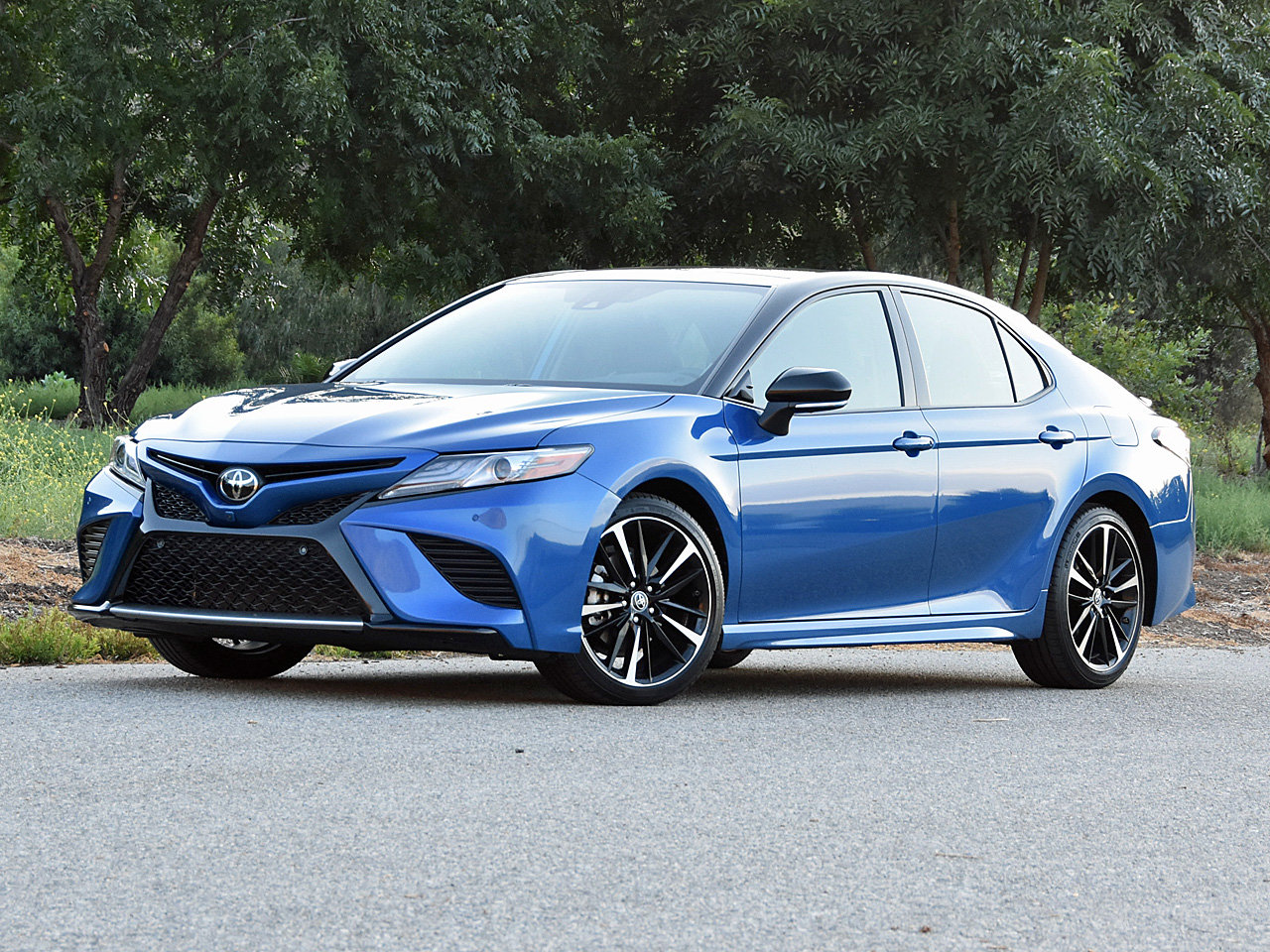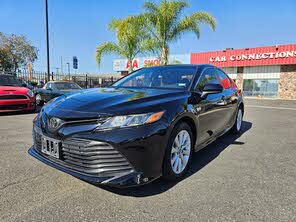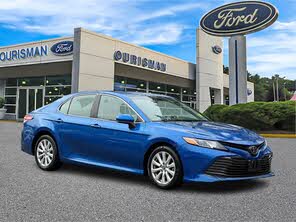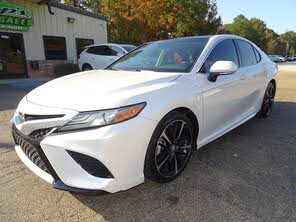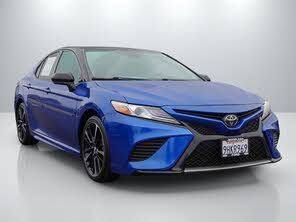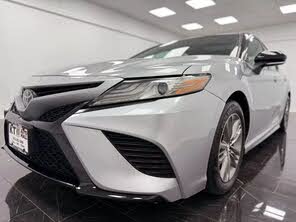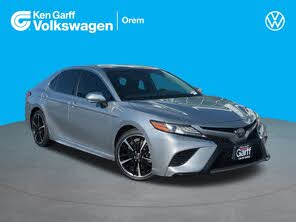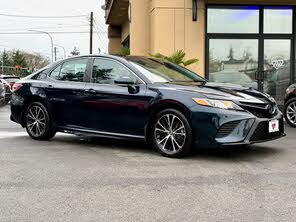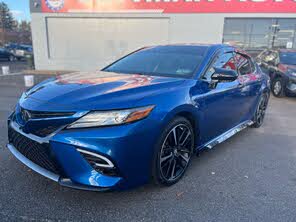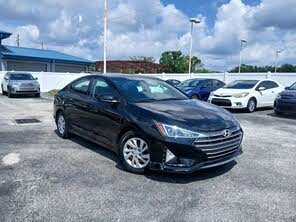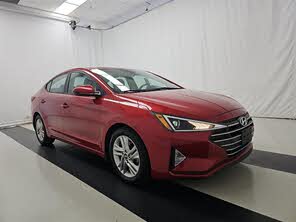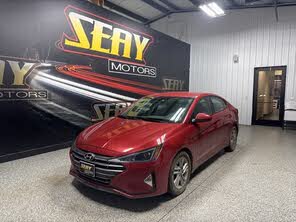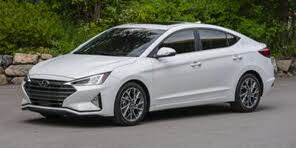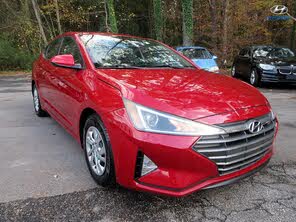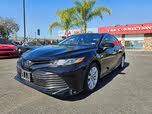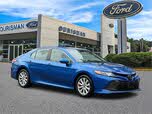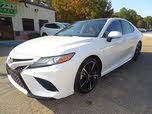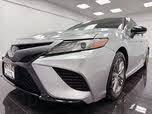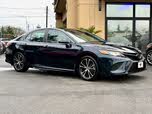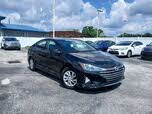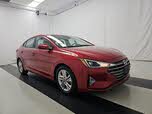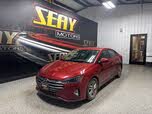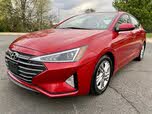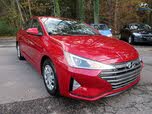2019 Toyota Camry vs 2020 Hyundai Elantra
Overview | |
MSRP$24,095 | MSRP$19,300 |
Listings1392 | Listings1020 |
Ratings & Reviews | |
User Reviews | User Reviews |
Expert reviews7.8 out of 10 | Expert reviews8.3 out of 10 |
Pros
Cons
| Pros
Cons
|
2019 Toyota Camry Reviews SummaryBlame the Toyota Avalon for the Toyota Camry’s flaws. In order to put daylight between itself and Toyota’s larger full-size sedan, the midsize Camry is now smaller than some of its competitors, while simultaneously offering fewer of the increasingly expected features in the segment. Still, there are several good reasons to consider a 2019 Camry, from its outstanding safety ratings to its free scheduled maintenance plan. It’s also one of a handful of family sedans that still offers a 6-cylinder engine. | |
2020 Hyundai Elantra Reviews SummaryHyundai isn’t pulling any punches when it comes to the compact car segment, where value is of utmost importance. And though a completely redesigned 2021 Elantra is coming soon, the automaker bestows several value-enhancing improvements upon the outgoing 2020 Hyundai Elantra compact sedan. They include free scheduled maintenance, improved fuel economy ratings, and new standard safety features. | |
No video found | |
Popular Features & Specs | |
Engine2.5L 203 hp I4 | Engine2.0L 147 hp I4 |
Drive TrainFWD | Drive TrainFWD |
Seating Capacity5 | Seating Capacity5 |
Horsepower | Horsepower147 hp @ 6200 rpm |
MPG City29 | MPG City31 |
MPG Highway41 | MPG Highway41 |
Engine | |
Engine Name2.5L 203 hp I4 | Engine Name2.0L 147 hp I4 |
Torque | Torque132 lb-ft @ 4500 rpm |
Horsepower | Horsepower147 hp @ 6200 rpm |
DrivetrainFWD | DrivetrainFWD |
Fuel Economy | |
MPG City29 | MPG City31 |
MPG Highway41 | MPG Highway41 |
Interior | |
Seating Capacity5 | Seating Capacity5 |
Safety | |
Front Crash Overall5 | Front Crash Overall4 |
Side Crash Overall5 | Side Crash Overall4 |
Dimensions & Capacity | |
Cargo Space14.1 cu ft | Cargo Space14.4 cu ft |
Curb Weight3241 lbs | Curb Weight2844 lbs |
Height56.9 in | Height56.5 in |
Length192.1 in | Length181.9 in |
Width72.4 in | Width70.9 in |
Wheelbase111.2 in | Wheelbase106.3 in |
Maximum Payload925 lbs | Maximum Payload1080 lbs |
Number of doors4 | Number of doors4 |
Overview | ||
MSRP | $24,095 | $19,300 |
Listings | ||
Ratings & Reviews | ||
User reviews | ||
Expert reviews | 7.8 out of 10Read full review | 8.3 out of 10Read full review |
Pros & cons | Pros
Cons
| Pros
Cons
|
Summary | Blame the Toyota Avalon for the Toyota Camry’s flaws. In order to put daylight between itself and Toyota’s larger full-size sedan, the midsize Camry is now smaller than some of its competitors, while simultaneously offering fewer of the increasingly expected features in the segment. Still, there are several good reasons to consider a 2019 Camry, from its outstanding safety ratings to its free scheduled maintenance plan. It’s also one of a handful of family sedans that still offers a 6-cylinder engine. | Hyundai isn’t pulling any punches when it comes to the compact car segment, where value is of utmost importance. And though a completely redesigned 2021 Elantra is coming soon, the automaker bestows several value-enhancing improvements upon the outgoing 2020 Hyundai Elantra compact sedan. They include free scheduled maintenance, improved fuel economy ratings, and new standard safety features. |
Video | No video found | |
Popular Features & Specs | ||
Engine | 2.5L 203 hp I4 | 2.0L 147 hp I4 |
Drive Train | FWD | FWD |
Seating Capacity | 5 | 5 |
Horsepower | 147 hp @ 6200 rpm | |
MPG City | 29 | 31 |
MPG Highway | 41 | 41 |
Engine | ||
Engine Name | 2.5L 203 hp I4 | 2.0L 147 hp I4 |
Torque | 132 lb-ft @ 4500 rpm | |
Horsepower | 147 hp @ 6200 rpm | |
Drivetrain | FWD | FWD |
Fuel Economy | ||
MPG City | 29 | 31 |
MPG Highway | 41 | 41 |
Interior | ||
Seating Capacity | 5 | 5 |
Safety | ||
Front Crash Overall | 5 | 4 |
Side Crash Overall | 5 | 4 |
Dimensions & Capacity | ||
Cargo Space | 14.1 cu ft | 14.4 cu ft |
Curb Weight | 3241 lbs | 2844 lbs |
Height | 56.9 in | 56.5 in |
Length | 192.1 in | 181.9 in |
Width | 72.4 in | 70.9 in |
Wheelbase | 111.2 in | 106.3 in |
Maximum Payload | 925 lbs | 1080 lbs |
Number of doors | 4 | 4 |
The 2019 Toyota Camry offered a choice between standard and sporty styling, with options for a 4-cylinder, a V6, or a hybrid powertrain. Trim levels varied based on engine selection, including L, LE, XLE, SE, and XSE. The Camry XSE with a V6 engine was quick and entertaining to drive, but not the recommended trim for value. The standard 2.5-liter 4-cylinder engine in LE trim was suggested for better value, while the upscale XLE was a favorite. The hybrid version, though fuel-efficient, required a significant upfront cost, making it less economical in the long run. The Camry's styling was bold but not cohesive, with oversized forms that didn't appeal to everyone. Inside, the Camry XSE featured high-quality materials, but some elements like the windshield pillars and switchgear felt out of place. The car's perceived quality was further dented by creaky front fascia and side mirrors, and a tinny noise from the front doors.
The 2020 Hyundai Elantra, unchanged from its 2019 restyle, featured a geometric-influenced design. Available in six versions—SE, SEL, Value Edition, Eco, Limited, and Sport—the Elantra's prices ranged from $19,300 to $24,150. The Limited test vehicle, with the Ultimate Package, had a sticker price of $27,630. The Elantra's black paint highlighted its angular design elements, creating a stylish appearance. Inside, the Elantra's interior was updated for a more upscale look, with silver trim accents. However, hard and glossy plastics reminded occupants of its mainstream compact car status. The Elantra offered comfortable accommodations for four adults, with a fifth person squeezed in for short trips. The Limited trim included power driver's seat adjustment, leather upholstery, and a sliding center console armrest for improved comfort. The dual-zone automatic climate control system with a Clean Air ionizer and automatic defogging system was standard, though rear air conditioning vents were unavailable.










The 2019 Toyota Camry's standard 203-horsepower, 2.5-liter 4-cylinder engine was suitable for daily driving, but the 301-hp, 3.5-liter V6 engine offered a thrilling experience. The V6's extra weight was noticeable but didn't limit handling, and the 8-speed automatic transmission provided quick, satisfying shifts. The Camry XSE's sport-tuned suspension and 19-inch aluminum wheels ensured responsive handling without sacrificing comfort. Steering effort was firm and natural, and the brakes performed well under repeated use, though the pedal exhibited a dissatisfying "thunk." Fuel economy fell short of expectations, with a test loop average of 21.9 mpg compared to the EPA's 26-mpg rating.
The 2020 Hyundai Elantra's base engine was a 147-horsepower, 2.0-liter four-cylinder paired with a new CVT, replacing the previous six-speed automatic. The Elantra Eco featured a turbocharged 1.4-liter engine with 128 horsepower and a seven-speed DCT, achieving 36 mpg in combined driving. The Elantra Sport offered a 1.6-liter turbo four-cylinder with 201 horsepower and an independent rear suspension for improved handling. The Limited test car's 2.0-liter engine and CVT provided a satisfactory driving experience, with the CVT's chain belt and wide-ratio pulley system enhancing efficiency. However, real-world fuel economy fell short, averaging 29.3 mpg compared to the expected 34 mpg. The Elantra's torsion beam axle rear suspension detracted from ride and handling, while the Sport trim's independent suspension offered a superior experience.
The 2019 Toyota Camry's cabin featured ample storage, including a large center console bin and a hidden compartment under the wireless charging pad. However, the glove box was small and hard to reach, and door-panel storage pockets were narrow. The trunk, at 15.1 cubic feet, was smaller than competitors, with limited space for luggage. The front seats offered 8-way power adjustment and heating, but ventilated seats were unavailable. Rear-seat passengers faced a snug space with narrow door openings and a low seating position, though upper trims included rear air-conditioning vents. The climate control system performed well in hot weather, but a ventilated seat option was missed.
The 2020 Hyundai Elantra provided roomy accommodations for four adults, with a fifth person fitting for short trips. The Limited trim included power driver's seat adjustment, leather upholstery, and a sliding center console armrest. All Elantras featured a dual-zone automatic climate control system with a Clean Air ionizer and automatic defogging. Interior storage was well-proportioned, and the trunk offered 14.4 cubic feet of space, nearly matching some midsize sedans. A grab handle inside the trunk lid made it easy to close.
The 2019 Toyota Camry's dashboard layout was dramatic yet functional, with an intuitive Entune 3.0 infotainment system. It included Apple CarPlay and a 6-month/2GB WiFi Connect subscription but lacked Android Auto. The test car featured a wireless charging pad and a navigation system, though the latter was slow to load traffic data. The JBL premium sound system was powerful but lacked clarity. A 10-inch head-up display was visible even with polarized sunglasses.
The 2020 Hyundai Elantra came with a standard touchscreen infotainment system, Bluetooth, and a USB port. The SE trim had a 5-inch screen, while the SEL and higher trims featured a 7-inch display with Apple CarPlay, Android Auto, and SiriusXM. The Limited trim added wireless charging and a premium Infinity sound system. The Ultimate Package increased the screen size to 8 inches and included navigation and additional services. The infotainment system was user-friendly, with a responsive voice recognition system. The Infinity sound system impressed with its depth of sound.
The 2019 Toyota Camry excelled in safety, earning 5-star ratings from the NHTSA and a Top Safety Pick+ from the IIHS. It included a Toyota Safety Sense suite with adaptive cruise control, forward-collision warning, automatic emergency braking, lane-departure warning, lane-keeping assist, and automatic high-beam headlights. A Safety Connect subscription provided additional safety features.
The 2020 Hyundai Elantra featured Hyundai Smart Sense, including forward-collision warning, automatic emergency braking, lane departure warning, lane-keeping assist, and a driver attention monitor. SEL trim and higher added blind-spot warning and rear cross-traffic alert. The Limited and Sport trims had full LED headlights with automatic high-beam operation. The Ultimate Package added adaptive cruise control and pedestrian detection. The Elantra earned a Top Safety Pick from the IIHS and a four-star rating from the NHTSA.
CarGurus highlights

According to CarGurus experts, the overall rating for the 2019 Toyota Camry is 7.8 out of 10, while the 2020 Hyundai Elantra scores 8.3 out of 10. Based on these ratings, the 2020 Hyundai Elantra is the recommended choice, offering a better balance of style, technology, and safety features.
Choose the 2019 Toyota Camry if:
- You prioritize top-tier safety ratings and advanced driver-assistance features.
- You prefer a midsize sedan with a powerful V6 engine option.
- You value Toyota's reputation for reliability and free scheduled maintenance.
Choose the 2020 Hyundai Elantra if:
- You want a compact car with a stylish design and modern technology features.
- You seek a vehicle with a user-friendly infotainment system and excellent sound quality.
- You appreciate Hyundai's comprehensive Smart Sense safety suite as standard.
CarGurus highlights

According to CarGurus experts, the overall rating for the 2019 Toyota Camry is 7.8 out of 10, while the 2020 Hyundai Elantra scores 8.3 out of 10. Based on these ratings, the 2020 Hyundai Elantra is the recommended choice, offering a better balance of style, technology, and safety features.
Choose the 2019 Toyota Camry if:
Shop Now- You prioritize top-tier safety ratings and advanced driver-assistance features.
- You prefer a midsize sedan with a powerful V6 engine option.
- You value Toyota's reputation for reliability and free scheduled maintenance.
Choose the 2020 Hyundai Elantra if:
Shop Now- You want a compact car with a stylish design and modern technology features.
- You seek a vehicle with a user-friendly infotainment system and excellent sound quality.
- You appreciate Hyundai's comprehensive Smart Sense safety suite as standard.

By: CarGurus + AI
At CarGurus, our team of experienced automotive writers remain at the heart of our content operation, conducting hands-on car tests and writing insightful guides that are backed by years of industry experience. To complement this, we are harnessing AI to make our content offering more diverse and more helpful to shoppers than ever. To achieve this, our AI systems are based exclusively on CarGurus content, ratings and data, so that what we produce is both unique to CarGurus, and uniquely helpful to car shoppers.
